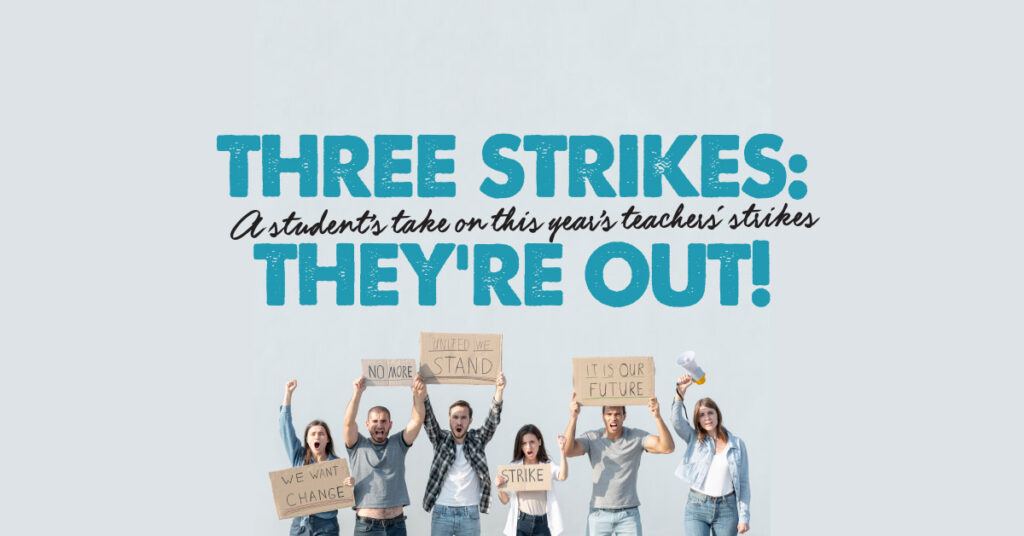
A student’s take on this year’s teachers’ strikes
Earlier this year, when I heard that teachers had voted to act on rolling strikes, I thought, ‘Really, again?’ Don’t get me wrong, I’m all for supporting teachers, but this feels so preventable. As a government that claimed they were all about the people and supporting current and future generations, why would you not invest in the future of your country and those contributing to it?
On average, teachers work 55 hours every week, in and out of the classroom. On top of this, they work an extra 21 hours a week during holidays. For most, teaching is incredibly taxing and time-consuming. In an NZCER survey, a participant said they struggled to find a healthy work-life balance, and “[they] take so much work home at night and at weekends that [they] have less time with [their] own children.” It’s obvious that our teachers care deeply for their students and the quality of their education. They work endless hours, pouring their hearts and souls into making sure their students have a structured, interesting and supportive learning environment. As the child of a teacher, I’ve witnessed the mountain of time she spends on lesson plans, marking and other admin tasks. She constantly stays late after school to complete work, and evenings at home often include over an hour of even more work. They’ve worked through pandemics, cyclones and other interruptions over the past few years, with little support from our government. They stay up late, wake up early, and dedicate their lives to educating future generations. Teachers deserve to feel valued and supported by our government, so why don’t they?
The reality is that teachers are still dealing with a lack of funding and resources for education. Worsening conditions in schools nationwide have created issues like crowded class sizes of up to 30 students. Back in March 2023, then education minister Jan Tinetti announced that classes would be reduced for 320 teachers by – wait for it – a staggering single student! From an average 1 to 29 student-teacher ratio to a 1 to 28 ratio! How much money was spent making the decision that won’t – by the way – come into effect till 2025? The money you spent on sitting in an office, deciding whether or not you could downsize a class could have – hear me out – been spent on paying your teachers higher wages … How relieving must it be for teachers to have one less child! In a class of 29 children all talking, shouting and making noise, one less student is going to make absolutely no difference, especially without help from a teacher aide. Teacher aides provide much needed assistance, but as they’re also underfunded, there’s a shortage of help for all schools in Aotearoa. The crippling workload, terrible pay and underfunded learning resources are destined to stress anyone out. Teachers can only put up with so much before action must be taken.
Strikes. Something we’ve all had the inconvenience of experiencing, hoping that maybe some good would come of it. With the strikes earlier in the year, students were blindly led to believe that for them, it was a free day off. Strikes might not have seemed like an issue but in reality, New Zealand’s attendance was already at tragically low rates. In the wake of Cyclone Gabrielle, covid, and other distractions, strikes were the last thing students needed. We were already feeling pressure to keep up with schoolwork, while having lives outside of school. Due to this, strikes created a division between schools and their communities, as teachers were labeled as ‘greedy’ or ‘immature’. I get it, strikes weren’t the best solution, but teachers could only handle so much before change had to be made. Teaching is high stress, so much so that 44% of teachers leave the profession within their first 5 years. Can we afford to lose any more teachers when there’s already a shortage? Yes, at any time strikes pose issues for students and whānau; but though they aren’t the most convenient, the issue could have been avoided if our government had listened to their teachers.
What was supposed to be a job for those who strived to support and uplift our future generations has become a rather unappealing career. Who would want to deal with parents and the community claiming that teachers are being greedy? Would you be happy putting up with years of poor treatment? If you were tired of the strikes, and if you thought they’re a waste of time, imagine how our teachers felt. Instead of focusing your anger at them, point the blame towards the source of all of this – the government. How many strikes will teachers endure before they’re out?
Words by Poppy Carpenter
Coromind: Coromandel’s Collaborative Magazine

Help us take Coromind Magazine to new heights by becoming a member. Click here
Change the Weather for Your Business: Advertise with Us.
Advertise your business in the whole Hauraki Coromandel in the coolest Coromandel Art Magazine, from Waihi Beach/Paeroa /Thames up to the Great Barrier Island.
Advertise Smarter, Not Harder: Get in Touch






